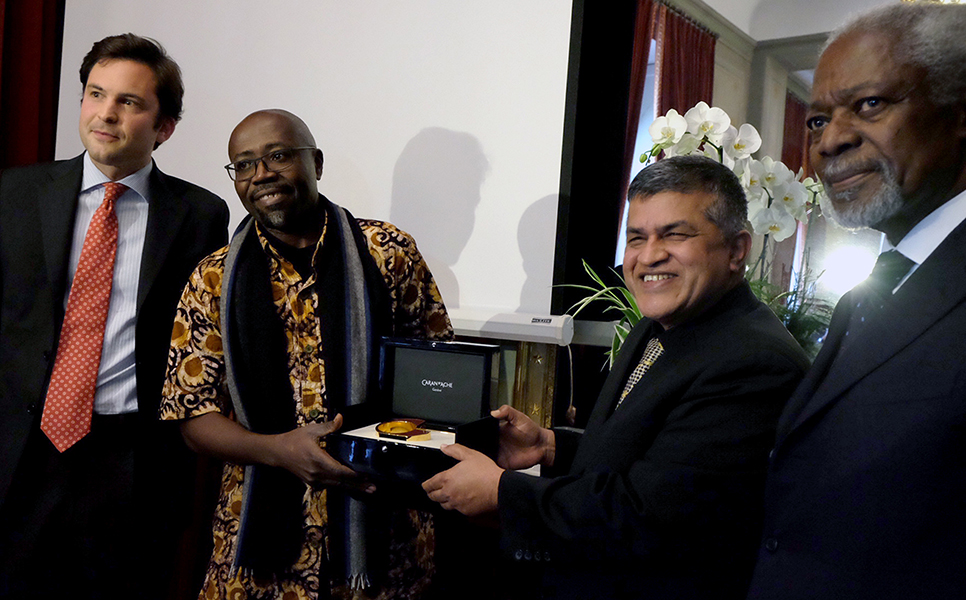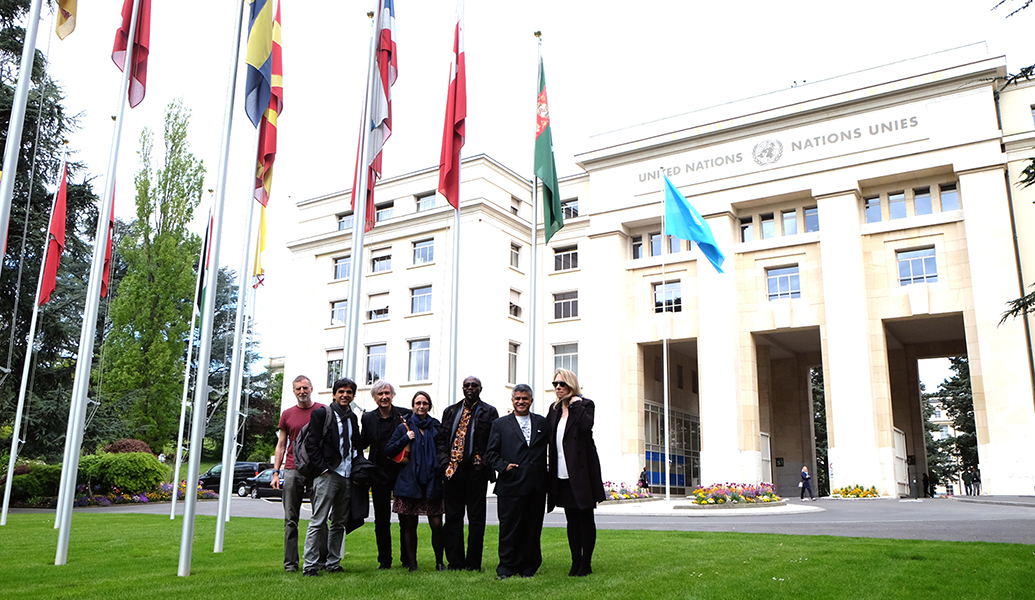R.B
JF-Expert Member
- May 10, 2012
- 6,296
- 2,575
The granting last week of the shared 2016 Cartooning for Peace award in Geneva to Tanzanian caricaturist Gado and Malaysian artist Zunar is not just in recognition of their talent, but also their willingness to risk loss of employment, prison and other forms of persecution. Journalist and author Edward Girardet explores the role these artists play in the pursuit of their craft, a much-needed form of critical expression at a time when news organizations, particularly in Africa and Asia, are increasingly reneging on their responsibilities to hold politicians to account.

Presentation of award by Kofi Annan (R) to Tanzanian cartoonist Gado (second from left) and Malaysian Zunar (second from right). Geneva government advisor Guillaume Barazzone. (L).

Geneva — Presenting the 3 May award was not just to mark World Press Freedom Day, maintained Kofi Annan, honorary President of Cartooning for Peace and former United Nations Secretary General, but also to “remind us how fragile this freedom is in Africa and Asia as well as other parts of the world…It is our responsibility to ensure the preservation of the freedom of expression and to support the fight of those who can only express themselves through their art.”
Swiss cartoonist Patrick Chappatte, who is vice-president of the Swiss-based Cartooning for Peace Foundation, added that “for having the courage to draw the king naked, Gado and Zunar are confronted by a power-mongering machine that seeks to silence them. The purpose of this prize is to amplify their voices as well as that of democracy and justice.”
When asked why governments and politicians so dislike cartoonists, both artists answered that cartoons appeal to everyone and are able to say more than other media. Cartoonst are simple, quick and powerful, they explained. And now they are everywhere, even if banned. They appear on the internet and are accessible to most people.
MAY 6, 2016

President John Magufuli of Tanzania at work. By Gado.
For Gado, who lives in Kenya and has been forced out of his job at the Kenyan Daily Nation, for daring to ridicule Kenyan and other African political leaders, the role of the cartoonist is Shakespearean. “Cartoonists are modern-day court jesters who make fun of those in power. Politicians take themselves far too seriously. When they are told that they naked, they find this a problem. And they don’t know how to deal with this. The danger is when you cross the line. Then you’re taking a risk.”
“The great thing about cartoons is that they are simple and appeal to everyone,” said Gado. One of his cartoons, for example, ridicules John Magufuli, president of Tanzania, by depicting him as corrupt, arrogant and surrounded by fawning women. Other drawings have criticized Kenyan politicians, including president Uhuru Kenyatta, for their lack of transparency and accountability. The end result is that the Kenyan government has brought pressure on newspaper and magazine editors to curb the ‘pests’ who dare to express themselves freely. The worrying matter is that editors and publishers are willing to bow to such pressures.

Zunar drawing on corruption.
Malaysian artist Zunar, whose 18 books have been banned by the Kuala Lumpar regime with further threats (eg. cancellation of sales’ licenses) against shops and vendors who dare to carry his publications. Zunar now faces 43 years imprisonment for mocking Najib Razak, the country’s prime minister, as well as his ruling Barisan Nasional party, which has been in power for 60 years. He goes to trial in July, 2016.
“Every regime and government in the world has a military. They know how to handle riots, but they have no idea how to deal with cartoons,” said Zunar, who has now dropped all his copyright so that anyone can use his drawings. This is the only way to beat the government, he maintains. “Cartoons are a very powerful medium and very universal. Cartoons have no age barriers and can reach everyone. They also appeal to people living in rural areas who cannot read. This is what these governments hate.”
“We introduce protests through our cartoons. We make people laugh and they laugh at the prime minister,” Zunar added. “The attitude is that if you can’t beat them (the government), then the least you can do is laugh at them. There is nothing the government can do. What is the regime going to do, stop people from laughing?”

Cartooning for Peace is holding an open-air exhibition along the lake in Geneva until 4 June, 2016. The exhibition is divided into five categories: the 2016 prize winners, Exodus, Liberty and Security, Cyber world and Planet Earth.
Edward Girardet is a Geneva-based journalist and author who has reported conflicts and humanitarian crises throughout Africa, Asia and elsewhere. He is currently director of the Global Geneva magazine project.

Presentation of award by Kofi Annan (R) to Tanzanian cartoonist Gado (second from left) and Malaysian Zunar (second from right). Geneva government advisor Guillaume Barazzone. (L).

Geneva — Presenting the 3 May award was not just to mark World Press Freedom Day, maintained Kofi Annan, honorary President of Cartooning for Peace and former United Nations Secretary General, but also to “remind us how fragile this freedom is in Africa and Asia as well as other parts of the world…It is our responsibility to ensure the preservation of the freedom of expression and to support the fight of those who can only express themselves through their art.”
Swiss cartoonist Patrick Chappatte, who is vice-president of the Swiss-based Cartooning for Peace Foundation, added that “for having the courage to draw the king naked, Gado and Zunar are confronted by a power-mongering machine that seeks to silence them. The purpose of this prize is to amplify their voices as well as that of democracy and justice.”
When asked why governments and politicians so dislike cartoonists, both artists answered that cartoons appeal to everyone and are able to say more than other media. Cartoonst are simple, quick and powerful, they explained. And now they are everywhere, even if banned. They appear on the internet and are accessible to most people.
MAY 6, 2016

President John Magufuli of Tanzania at work. By Gado.
For Gado, who lives in Kenya and has been forced out of his job at the Kenyan Daily Nation, for daring to ridicule Kenyan and other African political leaders, the role of the cartoonist is Shakespearean. “Cartoonists are modern-day court jesters who make fun of those in power. Politicians take themselves far too seriously. When they are told that they naked, they find this a problem. And they don’t know how to deal with this. The danger is when you cross the line. Then you’re taking a risk.”
“The great thing about cartoons is that they are simple and appeal to everyone,” said Gado. One of his cartoons, for example, ridicules John Magufuli, president of Tanzania, by depicting him as corrupt, arrogant and surrounded by fawning women. Other drawings have criticized Kenyan politicians, including president Uhuru Kenyatta, for their lack of transparency and accountability. The end result is that the Kenyan government has brought pressure on newspaper and magazine editors to curb the ‘pests’ who dare to express themselves freely. The worrying matter is that editors and publishers are willing to bow to such pressures.

Zunar drawing on corruption.
Malaysian artist Zunar, whose 18 books have been banned by the Kuala Lumpar regime with further threats (eg. cancellation of sales’ licenses) against shops and vendors who dare to carry his publications. Zunar now faces 43 years imprisonment for mocking Najib Razak, the country’s prime minister, as well as his ruling Barisan Nasional party, which has been in power for 60 years. He goes to trial in July, 2016.
“Every regime and government in the world has a military. They know how to handle riots, but they have no idea how to deal with cartoons,” said Zunar, who has now dropped all his copyright so that anyone can use his drawings. This is the only way to beat the government, he maintains. “Cartoons are a very powerful medium and very universal. Cartoons have no age barriers and can reach everyone. They also appeal to people living in rural areas who cannot read. This is what these governments hate.”
“We introduce protests through our cartoons. We make people laugh and they laugh at the prime minister,” Zunar added. “The attitude is that if you can’t beat them (the government), then the least you can do is laugh at them. There is nothing the government can do. What is the regime going to do, stop people from laughing?”

Cartooning for Peace is holding an open-air exhibition along the lake in Geneva until 4 June, 2016. The exhibition is divided into five categories: the 2016 prize winners, Exodus, Liberty and Security, Cyber world and Planet Earth.
Edward Girardet is a Geneva-based journalist and author who has reported conflicts and humanitarian crises throughout Africa, Asia and elsewhere. He is currently director of the Global Geneva magazine project.